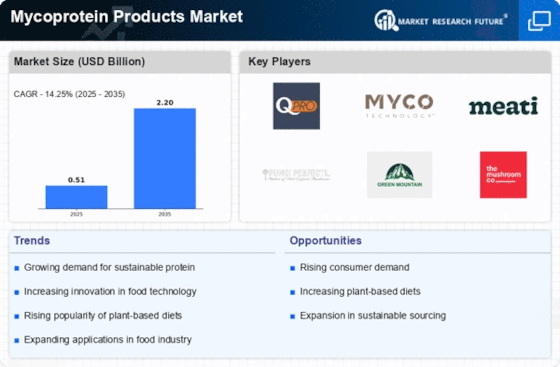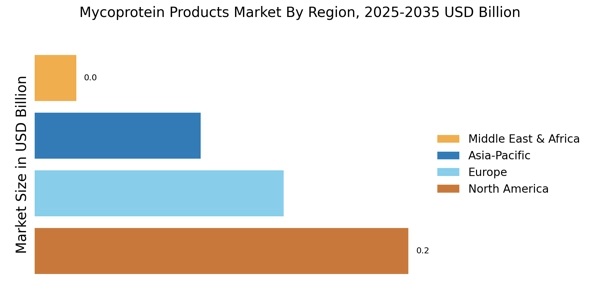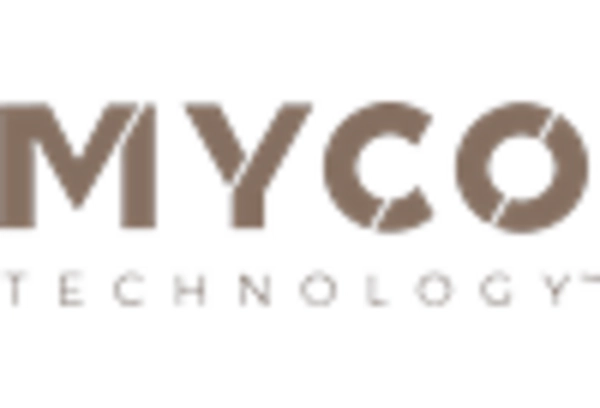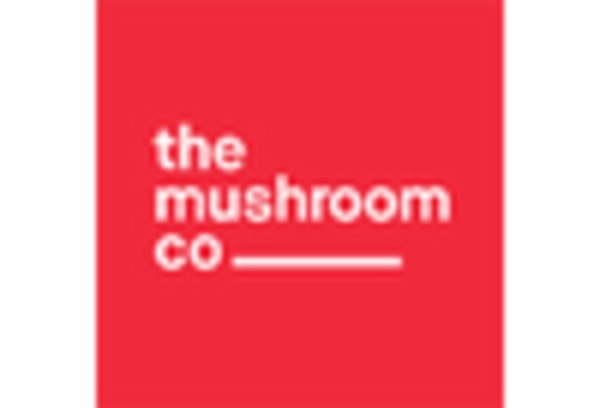Innovative Product Development
The Mycoprotein Products Market is witnessing a surge in innovative product development, which is likely to attract a diverse consumer base. Companies are increasingly investing in research and development to create new mycoprotein-based products that cater to various dietary preferences, including vegan and vegetarian options. This innovation is not limited to traditional food items; it extends to snacks, meat alternatives, and ready-to-eat meals. Market data indicates that the introduction of new flavors and textures is enhancing consumer interest, with some products achieving notable sales growth. As brands continue to innovate, the mycoprotein market is poised for expansion, appealing to both health-conscious consumers and those seeking convenient meal solutions.
Rising Vegan and Vegetarian Population
The growing population of vegans and vegetarians is a significant driver for the Mycoprotein Products Market. As more individuals adopt plant-based diets for health, ethical, or environmental reasons, the demand for alternative protein sources is likely to increase. Data suggests that the number of people identifying as vegan has risen dramatically in recent years, with some estimates indicating a growth rate of over 20% annually. This demographic shift is creating a robust market for mycoprotein products, which offer a nutritious and versatile protein source. As the trend towards plant-based eating continues, mycoprotein is expected to play a crucial role in meeting the protein needs of this expanding consumer segment.
Sustainability and Ethical Consumption
Sustainability concerns are increasingly influencing consumer choices, thereby driving the Mycoprotein Products Market. As environmental issues gain prominence, consumers are gravitating towards food sources that have a lower ecological footprint. Mycoprotein, derived from fungi, requires significantly less land and water compared to traditional livestock farming. Reports suggest that producing mycoprotein generates up to 90% less greenhouse gas emissions than beef production. This sustainability aspect resonates with environmentally conscious consumers, who are more likely to choose products that align with their values. Consequently, the mycoprotein market is expected to expand as more individuals prioritize ethical consumption, potentially leading to a broader acceptance of mycoprotein as a staple protein source.
Increased Availability and Accessibility
The increased availability and accessibility of mycoprotein products are likely to bolster the Mycoprotein Products Market. Retailers are expanding their offerings to include a wider range of mycoprotein-based items, from frozen meals to snacks, making them more accessible to consumers. E-commerce platforms are also playing a crucial role in this expansion, allowing consumers to purchase mycoprotein products conveniently from home. Market analysis indicates that the rise of online grocery shopping has contributed to a significant increase in sales of plant-based products, including mycoprotein. As distribution channels continue to grow and diversify, the mycoprotein market is expected to thrive, reaching a broader audience and enhancing overall market penetration.
Health Consciousness and Nutritional Awareness
The increasing health consciousness among consumers appears to be a pivotal driver for the Mycoprotein Products Market. As individuals become more aware of the nutritional benefits associated with mycoprotein, such as its high protein content and low fat levels, demand is likely to surge. Research indicates that mycoprotein contains all essential amino acids, making it a complete protein source. This aligns with the growing trend of consumers seeking healthier dietary options, particularly among those reducing meat consumption. The market for mycoprotein products is projected to grow significantly, with estimates suggesting a compound annual growth rate (CAGR) of over 7% in the coming years. This trend indicates a shift towards plant-based diets, further solidifying mycoprotein's role in modern nutrition.

















